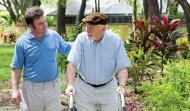Parents are welcome to help their children in hospital at meal times but the same is not true for elderly relatives. Yvonne Sawbridge asks whether we need to rethink our relationship with the state
Recently I attended HSJ’s commissioning summit, which was both thought-provoking and informative. In one session we discussed the need for mature discussions with the public, given the level of change that is required for the NHS of the future. Since then the secretary of state for health has talked about us learning from other cultures on how to look after our elderly relatives better, and urged us all to avoid the “national shame” of 800,000 older people being lonely. He commented that many are “parked” in residential care, without family support.
While I don’t entirely agree with Jeremy Hunt, as the plight of many unpaid carers is very real, both of these events sparked a thought about the relationship of citizens with the state – in this case, their (our) relationship with the NHS.
‘I recall one chief executive being pilloried in the press as they had issued a request for relatives to visit at meal times to help their loved ones to eat’
We have developed an approach that sees the NHS as something less of a community asset – we all have a part to play in supporting, maintaining and challenging – and more of a service with the concomitant nature of customer rights and expectations. Clearly this approach can have benefits in terms or driving up standards, but when our NHS is in trouble, maybe we need to engage as citizens rather than consumers to work together to help.
A good example of this approach can be found on the Kissing it Better website, whose founder Jill Fraser engages communities to invest time and effort in their local health service – taking dogs and choirs and hand masseurs onto wards, for example. The League of Friends and others also have a long and noble history of volunteering. However, these are individuals and groups who make a conscious decision to help – not a state of mind of the nation per se.
Help from relatives
What about helping NHS staff to look after our loved ones when in hospital beds? In the 1970s, the National Association for the Welfare of Children in Hospital campaigned for the rights of parents to stay with their child when in hospital. This is now accepted practice. However, if called upon to help our elderly relatives at meal times, or to stay with them (unless they are terminally ill), our response is likely to be less positive.
‘Not everyone would have a loving family member or close friends able and willing to offer support’
Indeed, I recall one chief executive being pilloried in the press as they had issued a request for relatives to visit at meal times to help their loved ones to eat, as the hospital was experiencing staff shortages at the time.
Of course, there will be many and complex reasons for this: the status of older people in our society; the relationship and geographical distance many have with older parents/families; the needs of carers for a break from the hard work of caring for people at home and so on. However, what would it take for us to begin to engage with requests for help differently?
This change would also involve staff, of course, many of whom are unused to working with carers to jointly look after patients. Roles, responsibilities and boundaries would need to be renegotiated. Risks would need to be reassessed. Here, community staff could offer expertise, as this is part of their daily life.
Not everyone would have a loving family member or close friends able and willing to offer support, and I am not suggesting staffing should be reduced on the back of expectations of family support. I am just wondering that if we started to think differently about our relationship with the NHS, maybe we could pool resources as a society and help it to improve.
Churches run successful campaigns for new roofs (as Archers fans will be well aware), and if the NHS is the nearest thing we have to a religion, then maybe we need to think about our roles as citizens in patching the NHS roof. Just a thought.
Yvonne Sawbridge is a senior fellow at Birmingham University’s health services management centre

























3 Readers' comments